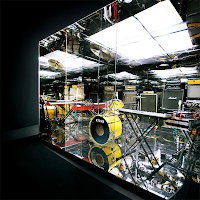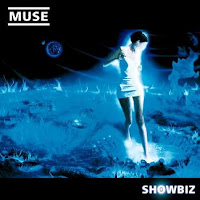
- Jump In The Pool
- In The Hospital
- Paris
- White Diamonds
- Strobe
- On Board
- Lovesick
- Skeleton Boy
- Photobooth
- Ex Lover
My first encounter with Friendly Fires was oddly incongruous - their appearance as support band at Interpol's long-delayed Newcastle show last year was easy to overlook given the pent-up anticipation reserved for the headliners. But, upon re-visiting the band after the show, I could feel that they weren't ones to be ignored. And so we come to this, their self-titled debut, which effortlessly continues this year's record of good indie-dance albums.
---
Let's get this out of the way first - Friendly Fires are unashamedly pop. Not in a manufactured, vomit-inducing, chart-humping-schtick sort of way, but in the fact that they want their music to be heard and liked by everyone. How to achieve this goal is the only question on their minds, and they've come up with a pretty good answer in leading track 'Jump In The Pool' - an irresistible intro to the band's style that combines an infectious groove with breathily emotional sensibilities, resulting in something simple but oh-so damn effective.
It's a line of thinking that informs the album throughout. 'Lovesick' aims for 'anthemic floor filler' status from the off, cementing it with a soaring chorus line, and 'Skeleton Boy' is equally masterful - when vocalist Ed Macfarlane sings "Let's face this night and see it through," it's a real fist-in-the-air moment. Even the almost comical cowbell-based bounce of 'White Diamonds' is transformed into a slick, heavy funk by the time the song reaches its edgy chorus.
Elsewhere, the band add to the majestic yearning of previous single 'Paris' in the only way possible - by roping in Au Revoir Simone to add some sweetly breathy female vocals to the song's already skyscraper-sized chorus. The tracks from previous EPs that made it onto the album are equally impressive, from the tense buildup of 'On Board's Hot-Chip-meets-The-Rapture disco-punk to the cocksure, jerky riffs of 'Photobooth'.
Even the lower-key moments maintain their lustre by applying the same formula that's gone before. 'Strobe's minimal, shoegazey synths and the downbeat bass groove of 'In The Hospital' both house choruses that pack a mighty emotional punch. However, the biggest heart-wrencher is saved until last: 'Ex Lover' sees a sinister, reverberating guitar line laced with darkly emotional lyrics concerning the death of a loved one - and yet, even this song has an oddly uplifting feel to it.
Friendly Fires is an album comprised of great songs, but its true brilliance is that it somehow manages to sum up to more than its already impressive parts. The band's debut album, therefore, is an understated triumph. It's the kind of record that stealthily creeps into your consciousness: Instantly replayable, it's only when you take a step back that you realise that an album you merely thought was 'quite good' is in fact blessed with a touch of genius. Friendly Fires have made one of this year's most effortlessly listenable albums - all you have to do is jump in.












